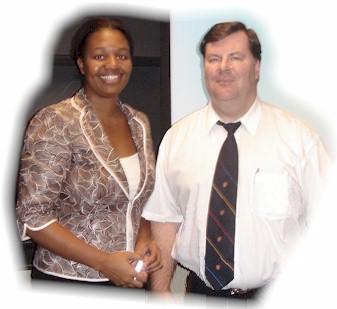| PODCASTING
see also witiger.com/ecommerce/podcasting2007.htm |
 |
originally created in co-operation with UTSC student Satish Kanwar in Oct, Nov, Dec 2006
ammended in Nov 2007 when Satish (now the TA for D06) arranged for Leesa Barnes to come back to D06 a 2nd time to give a guest lecture on Podcasting
| . | This page
used in the following courses taught by Prof. Richardson
.
|
|
INTRODUCTION
|
While
podcasting is new, the concept of podcasting is old - basically, it is
the same as reading a newspaper - that is to say you are taking the information
with you to go through later at your own convenience.
When
printing presses became more popular and an education system developed
and began to be accessed by the general public more people could read -
and so people would produce small sheets of announcements which could be
taken away and read later - the same concept as podcasting.
WTGR
|
|
Origins
of this unit on Podcasting |
In Sept 2007, Satish became the T.A. for D06 and offered to again arrange for Leesa Barnes to come to class in November and repeat her presentation on podcasting. In the November presentation,
we arranged for AV services to digitally record Barnes, and we are in the
process of editing the clips and hosting them on a server to the students
and view again the presentation given to the class that day.
|
|
Podcasting
Origins
of the term |
Globe
and Mail journalist Terry Weber published an article Dec 7th, 2005 in which
he noted the word of the year for 2005 – as picked by the editors of the
New Oxford American Dictionary – is podcast.
Weber explained:
"The term refers to downloadable audio files and draws its name from the hyper-popular line of music players marketed by Apple, although they can be listened to on other players as well." "Podcasts cover everything from individuals' personal musings on life to recaps of the latest episodes of Family Guy and Lost" "The New Oxford American Dictionary defines podcast as “a digital recording of a radio broadcast or similar program, made available on the Internet for downloading to a personal audio player.” |
|
Podcasting
of the termOrigins |
www.radiomarketingnexus.com
says
"Podcasting is the creation of subscribable audio content from your station or other source that can download automatically to your computer or mp3 device. Due to licensing rules podcasting generally does not include music content. Podcasting is time-shifted, choice-directed programming; it’s to radio what TiVo is to television - attractive content is recorded automatically for playback at the listener’s convenience." |
|
Podcasting
Problems
and challenges |
Kanwar
makes an abbreviated summary of the Sins… The
article is in reference to the "7 Deadly Sins of Business Podcasts"
as outlined by a self-proclaimed podcasting 'Reverend'. The sins are pretty
attention-grabbing: "1) Pride - Traditional sales funnel VS how it should really look like. 2) Lust - Traditionally marketers believe sex sells, but that's not the case here. 3) Envy - Finding a niche VS broad content. 4) Gluttony - Unrealistic early expectations. 5) Sloth - Simplicity over all else - and it doesn't take a lot of time, training, or money. 6) Wrath - "Likeability Factor". Podcasters have to respect their audience. 7)
Greed - ROI (return on investment) VS ROLI (return on listener involvement).
Numbers aren't everything in advertising (i.e. do Super Bowl ads really
have a direct traceable sales result?)." |
....
|
Podcasting
Leesa
Barnes |
Writer
Jason Lee Miller wrote a story on one of Barnes speeches, in which
she talks about podcasting. Miller's interpretation of Barnes speech is
really useful.See http://www.webpronews.com/topnews/topnews/wpn-60-200610017DeadlySinsofBusinessPodcasts.html
Ms. Leesa Barnes w Prof. Richardson on the occasion of her speech to the UTSC D06 class as a guest lecturer Oct 26th, 2006.
|
Audio clip (podcast)
made by University of Toronto (UTM) students
Betty (Wan-Tzu) C. and Margaret
(Tzu-Chiao) H. for
"Witiger Radio Show"
in March 2008
 |
 |
Click on the
girl's faces to hear
the full clip in English and Mandarin - it contains some funny and
amusing comments about earning class participations marks and their comments
also about the course
|
| As Betty explained in an
email March 30th, 2008
"We made this podcast called Radio Witiger for viral marketing strategy. By using two languages, Mandarin and English, we establish our target audience and attract both cultures’ attention, as the other “foreign” language acts as a clue for them. We assume audience only knows one language and by listening to snips of words in their language, they will be curious to know the rest of the puzzle, figuring out the context of the dialogue. In order to do so, they will have to ask their friends who know the other language, thus, spread the word of Radio Witiger and Professor Richardson. " |
 |
Click to the left to read
the English / Chinese (Mandarin) script
of the audio clip
(but do this after you listen
to the audio clip)
|
|
Podcasting
Rising
popularity |
The term
was originally conceived by journalist Ben Hammersley (www.benhammersley.com)
by combining the words “broadcasting” and “iPod”.Somewhat unsuitable considering
podcasts can be listened to on any digital music player.
In fact, critics have argued the term gives too much credit to Apple, charging that the company had little to do with the development of the technology. Some have suggested alternatives like blogcasting and audioblogging. |
|
Podcasting
Syndication |
In
general, syndication is the supply of material for reuse and
integration with other material...…For many years
mainly a feature of print media, today content syndication is the way
a great deal of information is disseminated across the Web. Reuters,
for example, provides online news content to over 900 Web sites and portals,
such as Yahoo and America Online. www.cesa8.k12.wi.us/media/digital_dictionary.htm |
|
Podcasting
Finding
podcasts |
Finding
podcasts has become relatively simple and fast, both due to Apple’s acceptance
and integration of it into its iTune’s software and its generally rising
popularity. Now,
Apple’s
iTunes software (www.apple.com/iTunes)
has been hailed “the google of podcasting”.Other
popular search locations for podcasts include www.podcastalley.com
and www.podcast.net. |
|
Podcasting
Examples |
It’s
a Purl, Man (www.itsapurlman.com)
– (mentioned by Leesa in her presentation) A podcast about a guy into knitting;
definitely a great way to meet chicks (i.e. all the comments are from females)!
Work
at Home Moms Talk Radio (www.wahmtalkradio.com)
– Started as an interest in the form of an internet radio station.Converted
to the podcast approach because costs were too high in the other method.
Starbucks:
Our Coffee (www.starbucks.com/ourcoffees)
– Received lots of negative feedback and bad reviews, stopping at episode
3.Focused too much on types of coffee beans.Could
have gotten customers to send in podcasts about their favourite coffees
or even store workers experiences with interesting orders (i.e. Niles’
peculiar coffee order from Frasier).
Ask
a Ninja (www.askaninja.com) –
You got questions, ninja got answers. Rocketboom
(www.rocketboom.com)
– Daily video podcast. |
|
Podcasting
Examples |
French
Maid TV (www.frenchmaidtv.com)
– Teaches users (typically males) how to register a domain name… with a
unique twist.
WTGR |
|
Podcasting
Examples
(class-generated) |
Reggae
Dancing
– Lori S. in UTSC D06 (Fall 2006) suggested this podcast about a personal
interest of hers talking about different moves in reggae dancing.Click
here to listen to what Prof. Richardson played for the class. Snowboarding
– Angie L. in UTSC D06 (Fall 2006) suggested this podcast about a personal
interest of hers discussing (and making money off of) great places in Ontario
to go snowboarding. Gaming
– Scott N. in UTSC D06 (Fall 2006) thought about a podcast in the gaming
industry.However he brought up a big concern that
there are already TONS of podcasts out there about everything gaming.Prof.
Richardson spun the idea to a unique new concept: making a podcast reviewing
gaming podcasts! The
key when developing a new podcasting idea is “becoming a google for something” (further
discussed in the problems and challenges later in this section).Go
niche and become insanely popular within it! |
|
Podcasting
“Selling
a house” |
What
a podcast entails can be summarized with an analogy of how one goes about
selling their house. When
selling your house (sitting on your land), you “stage” it and then hire
a real estate agent to promote it.As such, the formula
for selling your house is: (Sale
= Land + House + Sales Agent) $= Parallels
can be drawn when discussing the composition of a podcast.Your
podcast (“house”) must be hosted somewhere (“land”) and sold to users via
a distribution software / search engine (“sales agent”).This
formula for a podcast is: (Podcast
= Host + MP3 + iTunes)
|
|
Podcasting
Cdn Podcast Listeners Survey |

Enter the podcasting world from the viewpoint of just under 1000 Canadians at www.canadianpodcastlistenerssurvey.ca/. |
|
Podcasting
The
new ROI |
A
relatively new concept is ROI as “Return on Influence” VS “Return on
Investment”.As the competitive environment grows
and the markets change accordingly, the way companies’ measure performance
must also adapt.When companies adopt innovative mediums
such as corporate blogging, or in this case, podcasting, they should measure
results accordingly with the new ROI.
This
also answers the age old question in marketing: how effective are Superbowl
commercials?Impossible to answer with the old definition
of ROI, the new ROI clearly shows the massive return on influence that
Superbowl ads have (i.e. the reason why many companies launch new campaigns
or products with Superbowl ad investments in the millions).
|
|
Podcasting
The
long tail |
The
concept of “the long tail” comes from Chris Anderson, used to describe
business models of companies marketing in the information age.
“Anderson
argued that products that are in low demand or have low sales volume
can collectively make up a market share that rivals or exceeds the relatively
few current bestsellers and blockbusters, if the store or distribution
channel is large enough. Examples of such mega-stores include the online
retailer Amazon.com
and the online video rental service Netflix.
The
Long Tail is a potential market and, as the examples illustrate, the distribution
and sales channel opportunities created by the Internet often enable businesses
to tap into that market successfully.”
Red
= Big business Yellow
= Long tail – the most important part of the market In
essence, small markets (niche marketing) are the new in, targeting the
often ignored groups.The analogy plays off the fact
that most large organizations “close the door on the long tail” of the
cat; paying attention only to the mass market. The
long tail is where podcasts come into play and are most successful. A
detailed account of Anderson’s long tail concept, using companies marketing
in the information age as examples, can be downloaded at http://www.changethis.com/10.LongTail/download/?screen=0&action=download_manifesto. |
|
Copyright
and
legal
issues
|
The "Political
/ Legal / Regulatory" Environment effects Podcasting in a number of ways,
as pointed out by this UTM student below.
The article
that George found, and refers to is titled
"Copyright
Law and the Perils of Pirate Podcasts"
and was
posted on the technewsworld.com site March 14th 2007
the full
URL is www.technewsworld.com/story/56277.html
|
|
Copyright
and
legal
issues
|
George
reviewed the article "Copyright Law and the Perils of Pirate Podcasts"
and made
these comments for us
According
to this article, more people are starting to use podcasting as a means
for personal entertainment in the form of music. The music that is being
podcasted may be copyrighted materials or it may be materials that have
not been copyrighted. The article discusses about the legal implications
that a person may have if they podcast copyrighted materials. To legally
broadcast copyrighted materials, a person must gain permission from the
legal owner of the material. However, this has often been ignored when
it comes to podcasting. At the moment, most people are more concerned about
the sharing of music over file-sharing applications such as bittorent and
previously Napster. I would believe that one day organizations will turn
to podcasting and will be prosecuting those who are sharing these files
without proper permission from the owners.
WTGR
replies
Thanks
for the good comments, and it serves to remind us that the best way to
build your website and online content is to obtain permission as you build
- INSTEAD of having to go back later and try to find everybody you quoted
and ask for permission - which is one reason why I keep a couple of 3 ring
binders with copies of every email that I receive with permission to quote
stuff on witiger.com
|
|
Podcasting
Pink
spoon
marketing
|
|
for future exploration
Unleashing Creativity With
Student Podcasts
www.technewsworld.com/story/podcasting/56189.html
|
|
CONTACT I MAIN PAGE I NEWS GALLERY I E-BIZ SHORTCUTS I INT'L BIZ SHORTCUTS I MKTG&BUSINESS SHORTCUTS I TEACHING SCHEDULE |
| . | |
|
MISTAKES
ITEXTS
USED I
IMAGES
I
RANK
IDISCLAIMER
I
STUDENT
CONTRIBUTORS I FORMER
STUDENTS I PUBLICATIONS
I |
|
| . |






 +
+ +
+

